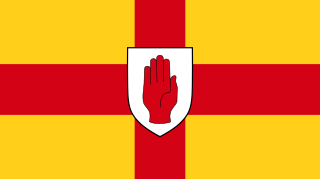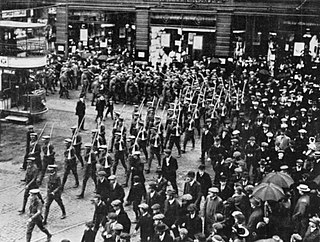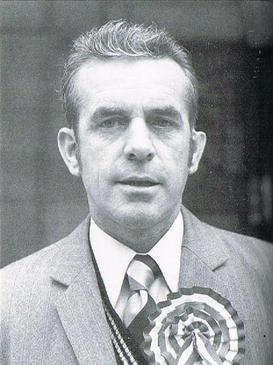
Ulster is one of the four traditional or historic Irish provinces. It is made up of nine counties: six of these constitute Northern Ireland ; the remaining three are in the Republic of Ireland.

The Ulster Volunteer Force (UVF) is an Ulster loyalist paramilitary group based in Northern Ireland. Formed in 1965, it first emerged in 1966. Its first leader was Gusty Spence, a former Royal Ulster Rifles soldier from Northern Ireland. The group undertook an armed campaign of almost thirty years during The Troubles. It declared a ceasefire in 1994 and officially ended its campaign in 2007, although some of its members have continued to engage in violence and criminal activities. The group is a proscribed organisation and is on the terrorist organisation list of the United Kingdom.

David Ervine was a Northern Irish Ulster Loyalist and politician who served as leader of the Progressive Unionist Party (PUP) from 2002 to 2007 and was also a Member of the Northern Ireland Assembly (MLA) for Belfast East from 1998 to 2007. During his youth Ervine was a member of the Ulster Volunteer Force (UVF) and was imprisoned for possessing bomb-making equipment. Whilst in jail he became convinced of the benefits of a more political approach for loyalism and became involved with the PUP. As a leading PUP figure, Ervine helped to deliver the loyalist ceasefire of 1994.
The Volunteer Political Party (VPP) was a loyalist political party launched in Northern Ireland on 22 June 1974 by members of the then recently legalised Ulster Volunteer Force (UVF). The Chairman was Ken Gibson from East Belfast, an ex-internee and UVF chief of staff at the time. The success of the Ulster Workers Council Strike had shown some UVF leaders the political power they held and they sought to develop this potential further. The UVF had been banned by the Government of Northern Ireland in 1966, but was legalised at the same time as Sinn Féin by Labour Secretary of State Merlyn Rees in April 1974 in order to encourage a political path for Loyalist and republican paramilitary groups.

Ulster loyalism is a strand of Ulster unionism associated with working class Ulster Protestants in Northern Ireland. Like other unionists, loyalists support the continued existence of Northern Ireland within the United Kingdom, and oppose a united Ireland independent of the UK. Unlike other strands of unionism, loyalism has been described as an ethnic nationalism of Ulster Protestants and "a variation of British nationalism". Loyalists are often said to have a conditional loyalty to the British state so long as it defends their interests. They see themselves as loyal primarily to the Protestant British monarchy rather than to British governments and institutions, while Garret FitzGerald argued they are loyal to 'Ulster' over 'the Union'. A small minority of loyalists have called for an independent Ulster Protestant state, believing they cannot rely on British governments to support them. The term 'loyalism' is usually associated with paramilitarism.
The Ulster Loyalist Central Co-ordinating Committee (ULCCC) was set up in 1974 in Belfast, Northern Ireland in the aftermath of the Ulster Workers Council Strike, to facilitate meetings and policy coordination between the Ulster Workers Council, loyalist paramilitary groups, and the political representatives of Ulster loyalism.
The Ulster Workers' Council was a loyalist workers' organisation set up in Northern Ireland in 1974 as a more formalised successor to the Loyalist Association of Workers (LAW). It was formed by shipyard union leader Harry Murray and initially failed to gain much attention. However, with the full support of the Ulster Defence Association (UDA) the UWC became the main mobilising force for loyalist opposition to power-sharing arrangements.
The Combined Loyalist Military Command is an umbrella body for loyalist paramilitary groups in Northern Ireland set up in the early 1990s, recalling the earlier Ulster Army Council and Ulster Loyalist Central Co-ordinating Committee.

The Ulster Volunteers was an Irish unionist, loyalist paramilitary organisation founded in 1912 to block domestic self-government for Ireland, which was then part of the United Kingdom. The Ulster Volunteers were based in the northern province of Ulster. Many Ulster Protestants and Irish unionists feared being governed by a nationalist Catholic-majority parliament in Dublin and losing their links with Great Britain. In 1913, the militias were organised into the Ulster Volunteer Force (UVF) and vowed to resist any attempts by the British Government to impose Home Rule on Ulster. Later that year, Irish nationalists formed a rival militia, the Irish Volunteers, to safeguard Home Rule. In April 1914, the UVF smuggled 25,000 rifles into Ulster from Imperial Germany. The Home Rule Crisis was interrupted by the First World War. Much of the UVF enlisted with the British Army's 36th (Ulster) Division and went to fight on the Western Front.

Ulster Resistance (UR), or the Ulster Resistance Movement (URM), is an Ulster loyalist paramilitary movement established by the Democratic Unionist Party (DUP) in Northern Ireland in November 1986 in opposition to the Anglo-Irish Agreement.
The following outline is provided as an overview of and topical guide to the Troubles.

William Mitchell was a Northern Ireland loyalist, community activist and member of the Progressive Unionist Party. Mitchell was a leading member of the loyalist Ulster Volunteer Force (UVF) and served a life sentence for his part in a double murder. He later abandoned his UVF membership and took up cross-community work.

Kenneth Gibson was a Northern Irish politician who was the Chairman of the Volunteer Political Party (VPP), which he had helped to form in 1974. He also served as a spokesman and Chief of Staff of the loyalist paramilitary organisation, the Ulster Volunteer Force (UVF).
Clifford Peeples is a self-styled pastor in Northern Ireland who has been associated with Ulster loyalism, for which he was convicted of terrorist activity and imprisoned. Peeples has been a member of the Ulster Volunteer Force (UVF), the Loyalist Volunteer Force (LVF) prisoners' spokesman and leader of the Orange Volunteers (OV). He has taken a prominent role in opposing the Northern Ireland Protocol in the courts.
Down Orange Welfare was an Ulster loyalist paramilitary vigilante group active in Northern Ireland during the 1970s. Operating in rural areas of County Down, the group faded after failing to win support away from larger groups such as the Ulster Defence Association (UDA) and Ulster Volunteer Force (UVF).
James Trevor King, also known as "Kingso", was a British Ulster loyalist and a senior member of the Ulster Volunteer Force (UVF). He was commander of the UVF's "B" Company, 1st Belfast Battalion, holding the rank of lieutenant colonel. On 16 June 1994, he was one of three UVF men gunned down by the Irish National Liberation Army as he stood on the corner of Spier's Place and the Shankill Road in West Belfast, close to the UVF headquarters. His companion Colin Craig was killed on the spot, and David Hamilton, who was seriously wounded, died the next day in hospital. King was also badly injured; he lived for three weeks on a life-support machine before making the decision himself to turn it off.

The Young Citizen Volunteers of Ireland, or Young Citizen Volunteers (YCV) for short, was a loyalist paramilitary organisation for loyalist youths which later became the youth wing of Ulster loyalist paramilitary group the Ulster Volunteer Force. It appropriated the name of the original Young Citizen Volunteers formed in 1912 as a British civic organisation.

The Orange Volunteers (OV) was a loyalist vigilante group with a paramilitary structure active in Northern Ireland during the early 1970s. It took its name from the Orange Order, from which it drew the bulk of its membership.
The Ulster Volunteer Service Corps (UVSC) was an Ulster loyalist vigilante and paramilitary movement active in Northern Ireland during the early 1970s. Initially the steward group for the Ulster Vanguard, under the title Vanguard Service Corps, it continued to exist after becoming independent of that movement.









